Todd Rundgren has worn many musical hats. He was the principal songwriter and guitarist for the 1960’s Anglophile band The Nazz, the solo pop star who wrote the 1972 hit “Hello, It’s Me” and co-wrote the 1983 anti-work anthem “Bang the Drum All Day”, and the leader of the prog-rock ensemble Utopia. He also produced the mega-hit Meat Loaf album Bat Out of Hell, and albums by many other artists including the New York Dolls, Patti Smith, and Grand Funk Railroad. This year, he was nominated for the Rock and Roll Hall of Fame.
This interview was for a preview article for noozhawk.com for Todd’s concert in San Luis Obispo on 11/9/18. It was done by phone on 10/24/18.
Jeff Moehlis: I want to congratulate you for being nominated to the Rock and Roll Hall of Fame. How did you find out that you were nominated?
Todd Rundgren: I’m trying to remember when I first heard about it [laughs]. I think I got a little bit of a heads-up before it actually happened, so I knew something was up before the general public did. But it was nothing official or anything like that, it was just some leak or rumor, something like that.
JM: We like to imagine that you get a 6:00AM phone call from Ringo, but I guess that’s not how it works.
TR: [laughs] No. I don’t think you get officially notified. Well, maybe my management does. Nobody called me directly.
JM: I know that your fans are very excited that you’ve been nominated. How do you feel about it? Is this something that’s important to you? Was it a surprise?
TR: Well [laughs], I’d always thought that if this ever occurred that it would be posthumous, so I’ve been trying to figure out a way to stage my own death.
JM: [laughs] That’s awesome!
Your upcoming show in San Luis Obispo is billed as “An Unpredictable Evening with Todd Rundgren”. Can we interpret that as meaning that you’ll play essentially whatever you feel like playing?
TR: It’s more or less that. We never play the same set twice. We have a master list of 50 or 60 songs that we could play. At this point, probably less than half of them are my songs, and the rest are rarities and one hit wonders and personal favorites, things like that, that make up probably at least fifty percent of the show. Sometimes more – it depends how it goes. Like I say, it’s unpredictable.
JM: Who will be joining you in the band at this performance?
TR: It’s pretty much my regular band. It’s Prairie Prince on drums, and Kasim Sulton on bass, Jesse Gress on guitar, and Greg Hawkes on keyboards.
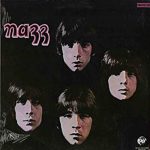
JM: Looking back at your catalog, I realized that the very first Nazz album was released almost exactly 50 years ago – it was released in October 1968. I know that includes the original version of “Hello It’s Me”. How did that song come together?
TR: It was the first song I ever wrote, in point of fact. Nazz was mostly doing covers by other artists – a lot of Yardbirds, and I think we might’ve done a Jimi Hendrix song or two [laughs], and some blues songs, and some R&B songs. It got to the point where we had to confront the fact that most bands, especially if they’re going to get signed, wrote their own material in those days. It wasn’t always like that, but The Beatles kind of changed the rules.
So I sat down to write what was essentially my first song. I don’t remember how long it took. I’m not sure that I did it in one session. I think I worked out the changes in one session, and sort of ruminated about what the lyrics should be and wrote them down probably later than that.
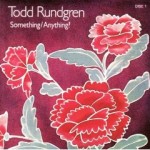
JM: Of course, you re-recorded that for your Something/Anything? album, which is viewed as one of your landmark albums. Looking back 40-some years later, what are your reflections on that particular album?
TR: It was a turning point for me in a couple of ways. One, of course, it was my first real commercial success, which made the label happy. But it also represented a turning point because when I finished the record I realized I was kind of copying formulas. I was working out of the same playbook as almost every other songwriter, using one relationship that I had in high school to fuel all the romantic lyrics on the record [laughs], and often writing a typical sort of song form.
Sometimes even simpler than a typical song form. “Hello It’s Me” only has two sections in it. And “I Saw the Light”, the first hit off of that record, had a more or less typical verse-B section-chorus form to it. So after I finished Something/Anything? I stepped back and realized that things were getting a little too formulaic for me, a little too easy. So that’s when I did A Wizard, a True Star, the following album, which had no hits on it [laughs]. It was a highly experimental record, and represented more the direction I was ultimately going to go in.
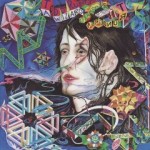
JM: A Wizard, a True Star is my favorite of your albums. So that was a reaction against what you saw as the songwriting formula you mentioned?
TR: It wasn’t what other people were doing. It wasn’t any sort of protest against the music scene in general. Coincidentally, I started taking psychedelic drugs [laughs], and realized that I had a lot more diverse musical ideas in my head than I was taking advantage of, and I wanted to get those out of my head and onto a record.
JM: Around that same time, you did the first Utopia record, which is another of my favorites from your catalog. That’s kind of a prog rock album. Was that similar, in that you had ideas floating around in your head that you wanted to get out?
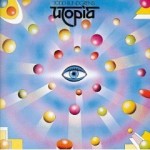
TR: It was partly that. I was very much influenced by bands like Yes and Gentle Giant, and Genesis – the original line-up with Peter Gabriel. I thought that prog rock was a fun thing, and at the same time there was also what they called fusion, which was sort of a modern jazz and rock combination, that Mahavishnu Orchestra represented. As I began to evolve as a songwriter I was playing less and less guitar, and thought that all the trouble that I had gone to to learn to play the guitar was suddenly going to waste. So a principal reason why I formed Utopia was so that I could go back to being the guitar player in the band.
JM: Another of your big albums, Hermit of Mink Hollow, turns 40 this year. What are your reflections on that album?
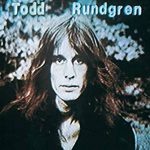
TR: Well, if I have the chronology correct, it was maybe the peak of my recording solo, in other words doing everything myself. I think I hit a good combination of performance and songwriting that wasn’t too scatterbrained, and wasn’t too simple-minded [laughs], to put it that way. Because I was never a great drummer, but I was able to play the things that I imagined, as long as I didn’t try to get too ambitious. So that was a fairly unique and popular album because it was more accessible than the several albums that had preceded it.
JM: You’ve also had quite a notable career as a producer. The biggest seller was Bat Out of Hell. Why do you think that was so successful?
TR: Well, I think there were some key factors that contributed to its success. The fact that it became one of the best selling albums of all time is a mystery to me. Because when we were doing it, everyone thought that we would be lucky just to get the record released. When we finished recording it, I had actually gotten into a position where I had to underwrite the costs of making the record. We did it in Bearsville Studios, and so Bearsville essentially put the cost of making the record on my debt to the label [laughs]. But they got the right of first refusal on the record, and they weren’t interested in it.
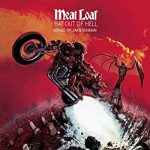
Neither was Warner Brothers, who was distributing Bearsville. It took them four to six months of shopping the completely done album before they ever found a label for it. So the whole idea that we were thinking, “Oh, this is going to be a great selling album” is mythological. At the point that the record came out everyone was just breathing a sigh of relief that it at least got released.
JM: That’s wild. Do you think that had you expected it to be successful that you would’ve done anything different? Maybe it’s a blessing that you didn’t expect it to be successful.
TR: I can’t imagine having done it different. You know, they were in the same position the first time they demoed the material for me. They demoed it live. As I was listening to them do it, I thought, “This is a spoof of Bruce Springsteen”, and that was my approach to the whole record. I thought of it in some ways as a comedy record, or a satire on Bruce Springsteen [laughs]. And I was the last producer that they went to. They might’ve gotten to the point where they gave up altogether, and there never would’ve been a Meat Loaf record.
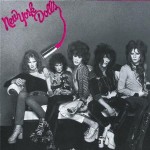
JM: You also produced the first New York Dolls album. What are some of your memories of doing that?
TR: It was something of a circus. The band was really big in New York City, but not much known outside of a certain scene within New York City. And nobody was calling it “punk”. It was actually the first time in quite a while that New York City, especially in the downtown crowd around CBGB’s and stuff like that, thought that there was native music scene going on.
After we finished the New York Dolls album and John Lydon and the Sex Pistols heard it, they called themselves “punk”, and so retroactively the New York Dolls became the first punk album, because that influenced the formation and the attitude of the Sex Pistols. I had no idea that this was going to turn into a larger scene, and a lot of the New York bands eventually were forgotten, or the New York scene mutated into something else. Also, I knew that I was moving out of the city, and I wanted to do something to acknowledge that particular scene before I sort of moved on, and started living a more pastoral existence.
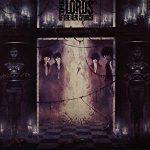
JM: One more production that I want to ask you about is the album Is Nothing Sacred? by The Lords of the New Church. What was it like working on that with Stiv Bators and Bryan James?
TR: Well, it’s sort of funny. Despite the kind of music that they made, Stiv had a very eclectic taste in music. He liked ballads, ironically enough, as much as he liked doing the hard thing. And we got along really well. He had some appreciation of songwriting outside of anything that might have resembled The Dead Boys. They were a lot of fun to work with, and unfortunately they never got the notoriety perhaps that a band like the New York Dolls or the Sex Pistols would’ve gotten. And then even more unfortunately Stiv passed on.
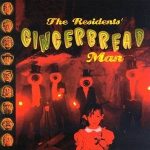
JM: For an article on “An Unpredictable Evening with Todd Rundgren”, I feel like I should ask an unpredictable question, one that you don’t get very often. It’s cool that you recorded with The Residents on a few of their albums. How did that come about, and what was it like to work with them?
TR: There was a whole scene going on in San Francisco that was driven, ironically enough, by a technology that Apple came out with called QuickTime, which you don’t hear much about now because it’s been folded into a larger and more generalized model of media. But the thing that nobody had in computers at the time was a way to synchronize sound and pictures and titles and video and that sort of thing, and that’s what QuickTime was designed to do. Once that came out there was a big overlap between technology – especially the Apple community – and artists in the area. There was a very aggressive attempt to liaise between artists and, especially, Apple, because Apple was promoting this new sort of media format. That format eventually became the basis of the early DVDs and early CD-ROMs, and things that would have multimedia presentations.
The Residents, who originally came from Alabama, I think, moved to San Francisco to take advantage of that. San Francisco was more receptive to their weirdo sensibilities, obviously, than Alabama was. At the same time I was living there, and I was going to the hacker’s conferences and the Apple developers conferences. So we were swimming in the same pool, essentially.
And then at one point I got involved with a company called NewTek who had a technology called the video toaster, that allowed you to put several cameras into a computer and do various switching effects and special effects and all sorts of things. So we did some showcase for NEC down in San Jose, and I essentially ran the video while they did a very bizarre musical and theatrical presentation for what was essentially a lot of Japanese businessmen.
JM: [laughs] Wow. I saw The Residents in 1997 and 1998 in San Francisco, both on Halloween night. That was a lot of fun.
TR: Unfortunately we got copied on an email from Hardy [Fox] saying that he was having health issues, and he was not going to battle them, so that was likely the last time we were going to hear from him. But I think that The Residents had kind of parted ways already before that happened.
JM: That’s too bad. [It was announced on 10/31/18 that Hardy passed away.]
You’ve been making music for 50-plus years, and have had a lot of success in various musical genres. Did you ever have any formal musical training?
TR: It was mostly informal musical training. I mean, fairly early on when my parents got me my first guitar, I got the guitar as part of a package that the music store sold my parents. They said if you buy this guitar it would only cost you $25, but then you have to pay for three months of guitar lessons. And I loved having the guitar, and I hated the lessons. Part of the lessons was that you were supposed to learn how to read notes in traditional notation and pick out the melodies on the guitar. So I only did that for the three months, and then I forgot all of that.
The only formal musical training I can think of that I had after that was attending chorus class in my junior high school [laughs], where the teacher essentially taught us how to sing properly. I thought that I was a baritone at the time, so we had to find the baritone part in the sheet music and follow along. But for me, once they did it right I had already memorized it, so I would fake the reading [laughs]. I wouldn’t actually read it. Since then, I’ve used programs that generate traditional notation, but I really just get the sounds with MIDI instruments and then translate the MIDI into standard notation. So no real formal training, actually.
JM: Obviously you’re doing the tour right now, but what’s next for you? Are you thinking of recording some new stuff, or is there anything else in the works?
TR: Fortunately by Thanksgiving weekend I will have wrapped up the touring for this year, and get a couple of months off the road so I can focus on other things. On December 21st my autobiography hits the streets. I’m continuing to do collaborations with other artists, and we’re figuring out some sort of model for releasing them that doesn’t require us to collect an entire album’s worth. The next serious thing that I have to do is in the spring. I’ll be doing a European, and maybe a world tour – I might even go to Japan – essentially to promote the book by doing a show, a concert about the book.
JM: Did you learn any surprises about yourself when you were writing the book?
TR: You know, I found it extremely difficult to do because I don’t dwell that much in the past. So it was a challenge to remember things in the right order, and the fact that it felt like homework doing it [laughs]. I hated homework and I hated school, so those things kind of slowed it down. I originally started writing it in the ’90’s, and I made the decision that I was only going to write up to my 50th birthday, and then whatever happens after that is a different book, because I got married and I started raising children. It’s a lot less interesting [laughs] than the first 50 years. I mean, it’s satisfying for me, but it’s less interesting for other people to read. They don’t want to hear about your kids all the time.
JM: That’s great that you wrote this. I always enjoy reading memoirs and autobiographies.
TR: Also, if I don’t do it then somebody else will do it, and I really won’t like that.

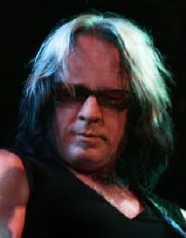
A very fine chat with Mr. Rundgren.
European tour eh? Should really make it a cheaper year for me. But, Japan sounds interesting…..